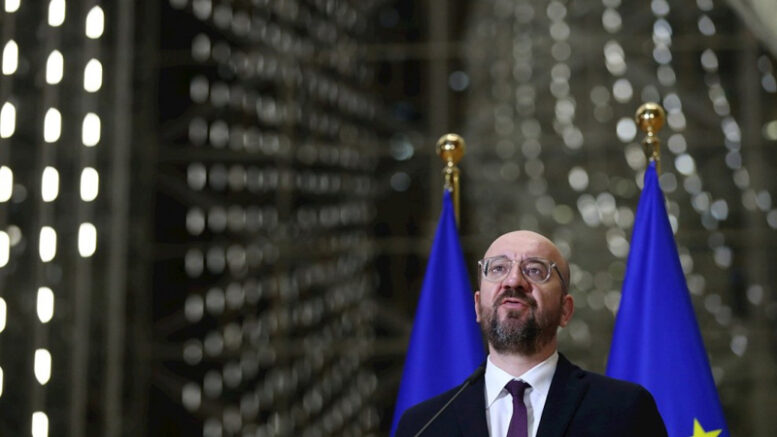► Germany, Holland and Austria insist on ‘every country for itself’ approach
► Spain, Italy balk at ESM mechanism linked to structural reforms, austerity
European leaders appear to be at an impasse in efforts to reach a joint approach to easing the economic burden of EU member states dealing with the coronavirus healthcare crisis, straining relations between countries and further undermining the unity and solidarity of a “European project” already destablilized by the 2015 refugee crisis and Britain’s exit from the EU just three months ago.
During a much-anticipated video-conference meeting on Thursday, prime ministers of EU member states did not better than their economics ministers two days earlier, failing to reach agreement on how best to finance the costs of dealing with the coronavirus crisis and in the absence of any consensus pushing off a decision for two weeks.
Any chance at reaching consensus during the video summit were dashed, when conservative government leaders of a bloc of countries led by Germany, Holland and Austria insisted on a policy amounting to “every country for itself”, refusing to agree to the idea aired by Italy and Spain of an EU-wide “coronabonds” mechanism that would let individual countries borrow as needed against a fund that is jointly funded by all EU member states.
► News Sources: Público, El Diario and El País …
Instead, the northern bloc said that Spain, Italy and other countries should only be allowed to access individual lines of credit through the same European Stability Mechanism (ESM) that was established during the 2008 global debt crisis. Tapping into the ESM for loans requires borrower countries to make structural changes to their economies and impose austerity measures to their budgets in order to receive the monies.
Pushed to accept the conditions, the prime ministers of Spain and Italy reportedly flatly rejected the idea that their countries should have to submit to further structural reforms and budget cuts to underwrite efforts to combat a pandemic virus that is threatening the stability of all countries across the EU.
Prior to the meeting, Spanish President Pedro Sánchez and the leaders of Italy, France, Portugal, Belgium, Greece, Luxembourg, Slovenia and Ireland has signed a joint letter to European Council President Charles Michel asking that debt assumed to deal with the crisis be “mutualized” or spread across all EU countries proportionally. In 2008, Germany and Holland were steadfast against a similar approach to dealing with financing the economic fallout for European countries of the global debt crisis.
During the video meeting Thursday, Germany’s Angela Merkel took the very same position as in 2008, making no distinction between the two crises. “On the individual level, no one would accept that their neighbor’s debt be mutualized using their personal resources”, Merkel said, rationalizing Germany’s position.
► News Sources: The Financial Times, Euronews and the BBC …
In the previous meeting of economic and finance ministers, Dutch Finance Minister Woke Hoekstra had gone so far as to suggest that an investigation be opened into why Spain and Italy did not have sufficient budget resources to counter the coronavirus crisis, the implication being the southern European were spendthrifts and should therefore be made to shoulder the costs of fighting the outbreak in their own countries.
Sánchez and his Italian counterpart, Giuseppe Conte, were reportedly incensed at the position taken by the leaders of the northern bloc of EU countries and walked out of the meeting, preferring to defer any agreement rather than sign onto an accord that would mandate further cuts to social spending and further neoliberal reforms to the structures of their economies.
Hoekstra’s comments were called “repugnant” on Friday by Portuguese Prime Minister António Costa. “That’s the most adequate word for it: re-pug-nant,” he said with emphasis. “We’re not willing to again listen to the same arguments from Dutch finance ministers that we heard in 2008, 2009, 2010 and every year since,” Costa said.
► Click to read more news about Spain’s Coronavirus crisis …
Check out more news from Spain about:
► Animal Welfare ► Corruption/Transparency ► Discrimination ► Education ► Elections ► Environment & Sustainability ► Fair Trade & Development Aid ► Healthcare ► Historical Memory ► Housing & Homelessness ► Human Rights ► Labour & Unemployment ► LGBT+ ► Politics ► Poverty ► Refugees & Migration ► Technology & Social Enterprise ► War & Peace ► Women’s Rights

All images at ProgressiveSpain.com are the copyright of their respective authors/owners and are reproduced here for non-commercial, journalistic purposes in accordance with Fair Use doctrine. All other content is Copyright © 2015-2020 ProgressiveSpain.com and is licensed under a Creative Commons Attribution-NonCommercial-ShareAlike 4.0 International License.

